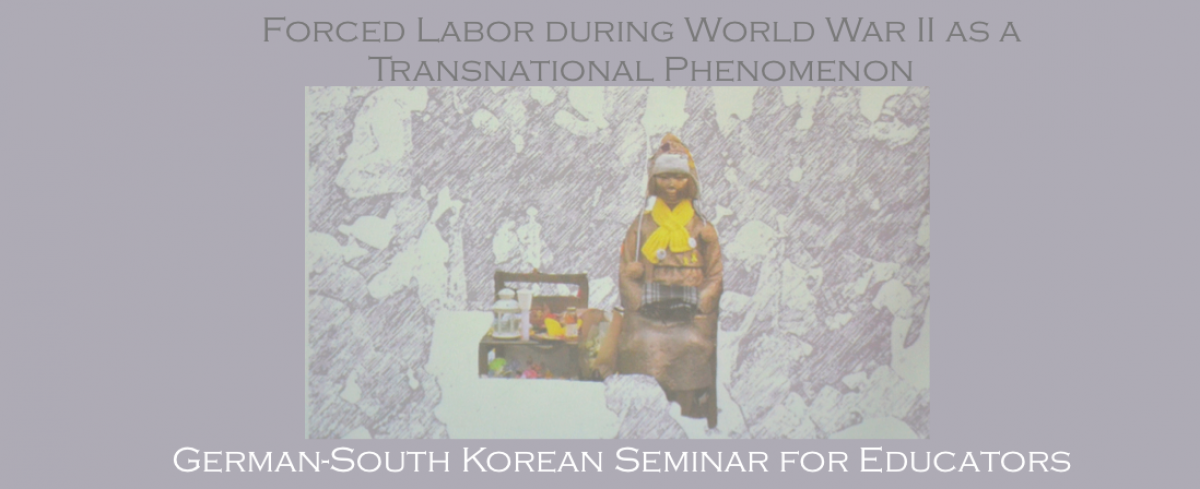The project was initiated and developed by Tanja Vaitulevich (Nazi Forced Labour Documentation Centre, Berlin) and Prof. Jie-Hyun Lim (Critical Global Studies Institute at Sogang University, Seoul).
The aim of the workshop has been to (1) to discuss contemporary challenges facing history educators in Germany and South Korea, with particular emphasis on teaching the history of forced labour during WWII (2) to acquaint the participants with teaching and research trends on forced labour during WWII (3) to encourage the exchange of ideas for partnered projects between German and South Korean participants and staff members.
The project consisted of two parts: Week 1 in Berlin (14-21 August 2016) and Week 2 in Seoul (7-15 April 2017). The first part of the workshop in Berlin focused on teaching the topic of Nazi forced labour in Germany. Each participant delivered an individual presentation highlighting their engagement with the topic. The participants exchanged ideas on relevant issues which ranged from the definition of forced labour to methodological questions on the role of public history in the field. Furthermore, they started developing educational workshops in German-South Korean teams on the topic of forced labour in a transnational perspective. The second part of the workshop in Seoul focused on forced labour under Japanese occupation and provided a forum for the participants to expand their discussion on the history and memory of forced labour. The participants implemented their workshops in South Korean schools and Universities and discussed the challenges and opportunities of teaching the topic using a transnational approach.
Historical Context
The history of Nazi forced labour is a history of forced migration of an unprecedented scale. As part of the total war strategy Germany decided to shift the war costs to the populations of conquered foreign territories and thus spare their own people from hardships and social unrest. To this end Ausländereinsatz (the deployment of foreigners) was implemented, which revealed strong contradictions between economic needs and the ideological doctrine of the racial purity of the Nazi regime. As a result, approximately 13,5 million women and men from all across Europe worked in all parts of the German Reich during WWII. Most of them were accommodated in poor barracks and camps, malnourished and held back from returning to their home countries. Moreover, forced labourers were employed all over the Reich making it one of the largest public crimes in history which was not acknowledged as such among large parts of the population for a very long time. More than 50 years passed before the German society dealt with the topic of forced labour and a small compensation was paid to some of the victims.
The history of forced labour during WWII was not solely restricted to the actual German but likewise affected all territories occupied by the Germans and their Allies during World War II.
The topic of forced labor under Japanese rule during World War II has been entangled in a series of complex historical questions over the nature of labour, its postwar history and memory, including the issues of repatriation and compensation. Japanese colonial rule in Korea started in 1910, entered the wartime period with the military engagement in Manchuria in 1931 and was later intensified with the beginning of the Sino-Japanese War and the Pacific War as a part of World War II. To meet the demand of the war economy Japanese government issued National Mobilization Law in 1938. As a result, about 700,000 Koreans were transported to Japan from 1939 to 1945 to work for private companies under the wartime industrial rule. They worked under harsh conditions including poor accommodation and malnutrition and were exposed to the military threat due to the fluctuating frontline. In addition, many women from imperial colonies were coerced into sexual slavery under the banner of “comfort women”, which brings in the “gender question” and adds even more complexity to the history of forced labor under Japanese Empire.
The legacy of forced labour and other World War II atrocities under Japanese rule has been a controversial political issue in South Korea. Unsettled diplomatic relations among the related parties including Japan, South Korea, and North Korea have not allowed them to reach a consensus or even start a debate over the complex questions of identity of the workers’ remains, their repatriation, and public memory yet. These questions have divided public opinion, initiated controversial discussions, without reaching a consensus.
